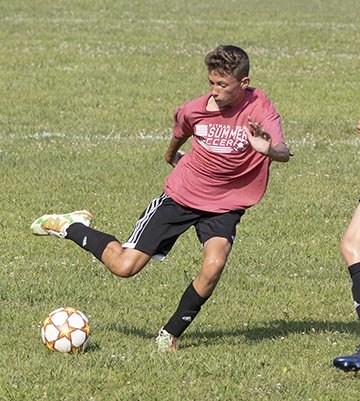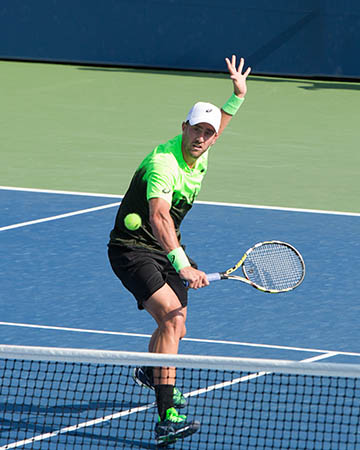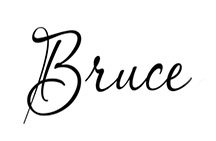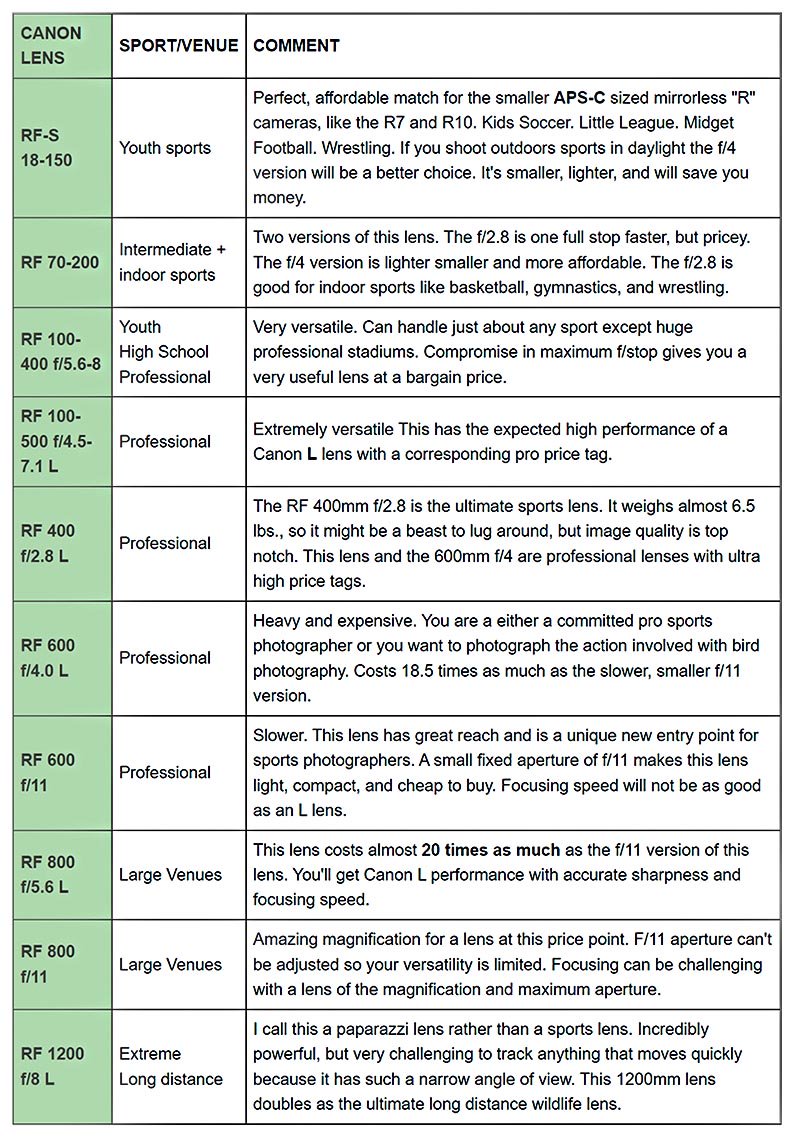Best Canon RF Lens For Sports
You're looking for the best Canon RF lens for sports. Now that Canon has significantly expanded their mirrorless lens lineup it's a good time to see what features to look for. This post will give you a list of the better RF lenses for capturing sharp images of the action in front of you under a variety of shooting situations.
 Canon EOS R camera. Canon EF 100-400 IS II Lens
Canon EOS R camera. Canon EF 100-400 IS II LensExposure was 1/1600 second at f/8 in bright sunshine.
No doubt that Canon has a large number of EF and EF-S lenses that are great for sports too, but this article will focus on the recently released mirrorless RF lenses. You can use one of the adapters to make your EF and EF-S lenses fit the "R" mirrorless mount cameras.
RF lenses benefit from the most advanced technology available and are compatible with the new mirrorless cameras which have fast frame rate.
We'll start by answering your question of what should you look for in a sports lens. The three most important specs of a good sports lens are focal length, maximum aperture, and focusing speed.
We'll look at the recommended focal lengths and maximum apertures in a minute, but fits, here is a table giving you an overview of the best Canon RF lenses for sports photography.
| CANON LENS | SPORT/VENUE | COMMENT |
| RF-S 18-150 |
Youth sports | Perfect, affordable match for the smaller APS-C sized mirrorless "R" cameras, like the R7 and R10. Kids Soccer. Little League. Midget Football. Wrestling. If you shoot outdoors sports in daylight the f/4 version will be a better choice. It's smaller, lighter, and will save you money. |
| RF 70-200 | Intermediate + indoor sports | Two versions of this lens. The f/2.8 is one full stop faster, but pricey. The f/4 version is lighter smaller and more affordable. The f/2.8 is good for indoor sports like basketball, gymnastics, and wrestling. |
| RF 100-400 f/5.6-8 | Youth High School Professional |
Very versatile. Can handle just about any sport except huge professional stadiums. Compromise in maximum f/stop gives you a very useful lens at a bargain price. |
| RF 100-500 f/4.5-7.1 L | Professional | Extremely versatile This has the expected high performance of a Canon L lens with a corresponding pro price tag. |
| RF 400 f/2.8 L | Professional | The RF 400mm f/2.8 is the ultimate sports lens. It weighs almost 6.5 lbs., so it might be a beast to lug around, but image quality is top notch. This lens and the 600mm f/4 are professional lenses with ultra high price tags. |
| RF 600 f/4.0 L | Professional | Heavy and expensive. You are a either a committed pro sports photographer or you want to photograph the action involved with bird photography. Costs 18.5 times as much as the slower, smaller f/11 version. |
| RF 600 f/11 | Professional | Slower. This lens has great reach and is a unique new entry point for sports photographers. A small fixed aperture of f/11 makes this lens light, compact, and cheap to buy. Focusing speed will not be as good as an L lens. |
| RF 800 f/5.6 L | Large Venues | This lens costs almost 20 times as much as the f/11 version of this lens. You'll get Canon L performance with accurate sharpness and focusing speed. |
| RF 800 f/11 | Large Venues | Amazing magnification for a lens at this price point. F/11 aperture can't be adjusted so your versatility is limited. Focusing can be challenging with a lens of the magnification and maximum aperture. |
| RF 1200 f/8 L | Extreme Long distance |
I call this a paparazzi lens rather than a sports lens. Incredibly powerful, but very challenging to track anything that moves quickly because it has such a narrow angle of view. This 1200mm lens doubles as the ultimate long distance wildlife lens. |
Next, we look at the single most important specification you'll look at to determine the best RF lens for shooting sports, focal length.
1. What size lens is best for sports
The right sports lens has to be of the proper focal length to give you the right angle of view and magnification. Zoom lenses have the most versatility, making them good for photographing different sports and different parts of the playing area.
How close you can get to the action is a big factor in determining the best focal length to use with your RF lens. I took the shot below using an under-sized lens, a 70-200mm lens, and had to crop the photo afterwards to get a closer composition.
 1/000 second at f/7.1
1/000 second at f/7.1Shot with 70-200mm lens @ 200mm
Cropped tighter with software
RF prime lenses have larger maximum apertures and we'll cover the advantages of that in a minute. Lenses with larger maximum lens openings are more expensive because larger glass elements are needed to make them.
The best lens focal length for sports photography depends on the specific sport and the venue it's being played in. Youth sports can be photographed with lenses having focal lengths of 70-300mm. High school, college, and pro level sports, where the playing fields are larger and spectator areas are farther from the action, need 300 to 800mm lenses.
2. What Maximum Aperture is best for sports
There are several advantages to having a fast lens with a larger aperture when shooting sports and other fast paced action photos. The best sports lenses have maximum lens openings of f/4.0, f/2.8 or faster.
This means they can allow more light to reach the sensor and means you can use faster shutter speeds to freeze the action. Larger maximum apertures also prevent you from having to use a super high ISO setting and you can avoid loss of image quality.
For shooting indoor sports, where the light is dim and the action is close by, you could even use a short and fast telephoto prime lens like the Canon RF 100mm f/2.8 macro. It's very sharp at its widest f/stop setting, f/2.8 and it focuses fast.
Many sports photographers shoot by setting the shutter speed first to get sharp photos, and then allow the camera to determine the right aperture for the best exposure. They use shutter priority for the camera setting, rather than aperture priority. Here's a post on using the right Canon shutter mode.
3. Fast Focusing Speed
Fast focusing lenses have an advantage when it comes to photographing sports. Unfortunately, there is no standard increments like f/stop numbers or focal lengths to use to compare different lenses for sports photography focusing. Pre-focusing on a spot where the action is about to take place helps reduce the time it takes for your lens to focus on the action.
You will come across situations where focusing speed is critical and other situations where it's not. It depends on the direction of the action in relationship to the distance from the camera and lens.
Side to side motion focusing distance isn't changing, so once you focus you can shoot without the need for changing the focus. Front to back subject movement is more challenging because the focusing distance is continuously changing.
Canon RF Sports Lens List
1. Canon RF-S 18-150mm f/3.5-6.3 IS STM Lens
This is the most affordable RF sports lens on the list. Priced at less than $500 at the time of this post, this is a smaller, lighter lens intended to be use on one of the smaller APS-C mirrorless camera bodies. Canon smartly designed the R system so that you can use these smaller "crop" lenses of a full frame mirrorless camera body. You're just "wasting " some of the sensor by not using the outside areas of the sensor.
The RF-S 18-150mm focal length gives you the equivalent reach as a 240mm lens would on a full frame camera. Here's more details on my most frequently used RF-S lens, the 18-150mm f/3.5-6.3.
2. Canon RF 70-200mm f/2.8 L IS USM Lens
Although the EF version of this 70-200mm focal length range lens has been the favorite of portrait photographers for a long time, it's a superb choice for indoor sports photography. This is my go to lens for shooting basketball and wrestling.
The f/4.0 lens has the exact same focal length, albeit with a 1 stop slower maximum aperture. Although not as good for shooting in the dimmer indoor venues, it costs about $1000 less than the f/2.8 version. The 70-200mm focal length is good for youth sports where your distance to the action is not too large.
3. Canon RF 100-400mm f/5.6-8 IS USM Lens
The RF 100-400mm lens is the ideal lens for the beginning sports photographer. It's price point is simply too good to pass up unless you're upgrading from an intermediate telephoto like a 70-300 for our APS-C camera.
The image stabilization is very effective and the lens is already compact and light in weight.
4. Canon RF 100-500mm f/4.5-7.1 L IS USM Lens
The RF 100-500 is the heftier pro version of the RD 100-400mm lens. It gives you the performance of an "L" lens with 25% more zoom reach, a 20% wider maximum aperture at 100mm focal length, and weather sealing.
The RF 100-500 weighs more than twice as much and costs 4 times as much as the 100-400 F/5.6-8 lens.
5. Canon RF 400mm f/2.8 L IS USM Lens
This is the choice of many pro sports photographers. It's big and bulky, but manageable with the use of a monopod for support. It's fast. It's powerful. It's sharp. It's a huge investment. The f/2.8 aperture allow maximum light to enter the camera and gives you the ability to use faster shutter speeds and/or lower ISO settings for the ultimate in image quality.
I recommend it for only the most serious action shooters, those with healthy camera gear bank accounts, or those who just won the mega million lottery and have nearly unlimited funds for photography gear.
At this point the supply and demand levels have limited the number of consumer reviews of this RF 400mm f/2.8 lens, but the reviews that have been made are all 5.0.
6. Canon RF 600mm f/4 L IS USM Lens
The RF 600mm f/4.0 lens has very similar attributes as the 400mm f/2.8. It has 50% more magnification reach at the expense of being one f/stop slower. Requiring an equally substantial investment, this lens also gets nothing but 5 star reviews.
It's likely too heavy (6.8 lbs.) to use handheld while standing up without additional support in most situations, but that's true of lenses in this focal length/maximum aperture class of sports and wildlife lenses.
7. Canon RF 600mm f/11 IS STM Lens
The RF 600mm f/11 is one of the most intriguing telephoto lens offerings in several years made by Canon, or any other company for that matter.
To be able to get a sports lens with this much magnification for less than $700 is remarkable. With that said, this lens is not for everybody. The constant f/11 aperture limits the versatility of situations in which you can use tis lens.
When light levels are lower, you may find it challenging to get a fast enough shutter speed to use this f/11 lens while photographing fast moving subjects. The Canon RF cameras you attach your lens to do perform well in terms of high ISO settings, but your tolerance for noise or any reduced sharpness is subjective.
8. Canon RF 800mm f/5.6 L IS USM Lens
This bazooka of a lens has twice the reach of the Canon 400mm lenses, giving you the ability to isolate individual athletes at a distance. Weighing in at 6.9 lbs., it's 2 stops faster than the f/11 lenses covered in this article.
Generally speaking 800mm lenses are not needed for most sports photography. If you're stuck in the back row or you have physical barriers blocking closer access, then the reach of an 800mm lens is useful.
9. Canon RF 800mm f/11 IS STM Lens
This is a very powerful telephoto zoom lens that is light enough to hand hold, weighing less than 3 lbs. Coming in at less than $900 at the time of this post, it's exciting to be able to get this powerful of a new lens for this price.
Just like the 600mm f/11 lens, this lens will have limitations based on its slow speed. Additionally you won't get the same focusing performance out of this lens as you will with the faster, bulkier L versions.
10. Canon RF 1200mm f/8 L IS USM Lens
With a focal length of over 1 meter you'd expect this to be a heavy lens and it is. It weighs over 7 lbs. The RF 1200 mm f/8 lens is a specialty lens with limited uses. For close to $20,000, you need to be confident that you'll get enough use out of it to justify such a large investment.
I included this in the list of sports lenses reluctantly, but it certainly could be used successfully in a few very specific situations. Sports photography would be extremely challenging because of its weight and length and its extremely narrow angle of view. For slow or no movement subjects and plenty of daylight.
As mentioned this lens might be more appropriate for paparazzi photographers and law enforcement surveillance purposes.
RF Sports Lens Summary
The RF sports lenses are the best ever made at this point. If you can afford one, I'm sure you won't be disappointed. Fortunately, with such a vast price range of prices with RF lenses for sports photography available, you can easily find the right fit for you and the budget you had in mind.
In general, the best sports lens lists are usually dominated by prime lenses because of their larger maximum apertures making them faster. Only one of the recommended sports lenses below came from my list of all the RF prime Lenses. My top 3 recommendations for a Canon RF sports lens are as follows. All have very reasonable price tags:
RF-S 18-150MM F/3.5-6.3: Ideal for in-town athletic events where you don't have to watch from a far distance and for photographers who have a smaller mirrorless camera with an APS-C sensor.
RF 100-400MM F/4.5-7.1: This is the most versatile sports lens of all the RF lenses and the price is nice.
RF 600MM F/11: Best lens at a surprising price for the outdoor sports photographer who must shoot at a bit of a long distance.
HONORABLE MENTION: Either of the two RF 70-200mm zoom lenses. Both are high performance L lenses, have mid-range indoor sports shooting ability, and are outstanding as portrait lenses too.
I truly hope this overview of the best RF sports lenses helps you make the right choice.
As an Amazon affiliate Canon Camera Geek receives a small commission from qualifying purchases, at NO added cost to you.


Bruce Lovelace is the publisher of Canon Camera Geek. Read more about him on the About Page. He also publishes how to articles and camera gear reviews at the Photography Tips website.
View some of Bruce's photos on Instagram and Flickr. Join the tribe of followers on YouTube. Bruce also runs photo workshops and provides 1 on 1 digital photography coaching.
Recent Articles
-
Choose the Right Memory Card for Your Canon R6 Mark II: Speed And Size
Nov 05, 25 02:04 PM
R6 Mark II Memory Card -
Canon G1x Mark II vs G1X-Side By Side Comparison of Canon G1X Cameras
Oct 22, 25 08:35 AM
G1 X Mark II vs. G1 X: Is the New Version a HUGE Leap... Or a Massive Mistake? Canon responded to the criticisms of the original G1X. Canon G1X Mark II vs G1X -
Sony RX100 III vs G1x Mark II by Canon. Side by Side Comparison
Oct 22, 25 08:07 AM
It's another one of those epic camera battles, this time not the Canon vs Nikon but rather the RX100 III Vs G1X Mark II battle. -
Canon R6 Mark II FAQ. Answers To All of Your Canon R6 M2 Questions
Sep 01, 25 07:51 AM
There's a lot you can easily learn about Canon's mirrorless R6 Mark II camera. Get your questions answered in this R6 Mark II FAQ -
Canon G1X Sensor Size. What Are The Specs on The Canon G1X Sensor
Aug 26, 25 11:39 AM
Here is a comparison of the Canon G1X sensor size with the rest of the "G" series Canon cameras














